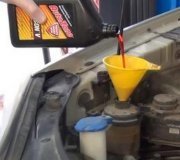The first response is way off base. If that were my employee and my explanation did not satisfy him, he would be fired! The second response is correct. To put it another way, you got junk! Brake fluid is a glycol product. The rubber parts used in the system are absolutely not compatible with petroleum products such as power steering fluid, engine oil, or automatic transmission fluid.
There is only one proper repair. That involves replacing every part that has rubber parts that contact the brake fluid, and flushing and drying the steel lines. That means the front calipers, rear wheel cylinders, all rubber flex hoses, master cylinder, combination valve, and the reservoir cap if a new one does not come with the master cylinder. If any of those parts are not replaced, the petroleum product will leach out of the contaminated parts and recontaminate the fluid.
To prove to my students how serious this is, every year I placed a pair of wheel cylinder lip seals into a pair of beakers with about an inch of new brake fluid. In one I added one drop of engine oil or power steering fluid. By the end of the week the seal in the contaminated fluid had grown by about twenty five percent and was real mushy.
I have been personally involved with three cars with fluid contamination. It is a real big headache. If your vehicle has anti-lock brakes, you might consider sending it to the junkyard. The hydraulic controller is very expensive and is full of rubber seals and o-rings. Also, keep in mind the front calipers and rear wheel cylinders are made from cast iron which is porous. We used to always rebuild those parts during regular brake jobs. Today rebuilt calipers and new wheel cylinders are very inexpensive. Do not try to rebuild those parts because contamination can leach back out of the cast iron. If you try to save money by thinking the contamination has not reached some part yet, you will be chasing problems for the rest of the life of the vehicle.
Another sad tale happened in the mid 1980's at a Sears Auto Center. Someone used a funnel that had been used for engine oil to fill their pressurized brake bleeder ball with three gallons of new brake fluid. They wiped the funnel clean but did not use any cleaning chemicals like brake parts cleaner. The very little residue in the funnel contaminated the entire three gallons of new fluid, and caused brake problems that they had to repair on dozens of cars before they figured out the problem.
Wednesday, July 13th, 2011 AT 6:51 AM



